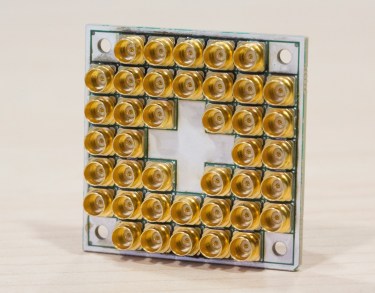
Intel’s quantum computing efforts have yielded a new 17-qubit chip[1], which the company has just delivered to its partner in that field, QuTech in the Netherlands. It’s not a major advance in the actual computing power or applications — those are still in very early days — but it’s a step towards production systems that can be ordered and delivered to spec rather than experimental ones that live in a physics lab somewhere.
Intel’s celebration of this particular chip is a bit arbitrary; 17 isn’t some magic number in the quantum world, nor is this chip do any special tricks other quantum computer systems can’t. Intel is just happy that its history and undeniable expertise in designing and fabricating chips and architectures is paying off in a new phase of computing.
I chatted with Intel’s director of quantum hardware, Jim Clarke, about the new system.

The test chip itself. (The gold ports aren’t the qubits themselves, obviously)
“We’re relying on our expertise in hardcore engineering,” he said. “We’re working on all parts of the compute stack: the chip, the control electronics, the system architecture, the algorithm.”
It’s not quite like popping out a new Core processor every year, but there’s plenty of overlap.
“Our infrastructure allows us to adapt the materials and the package,” Clarke said. “If you think of a material that might be good for a qubit chip, Intel likely already has a mature process for that material or at least experience with it..”
That isn’t easy when the field of computing they’re attempting to enter is largely theoretical. That’s why partners like QuTech, a research institute under TU Delft, are essential. Intel isn’t short on big brains, but...